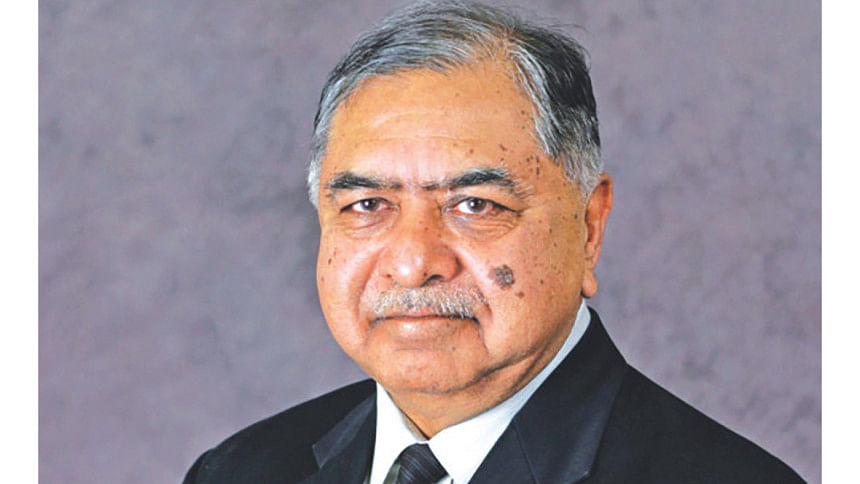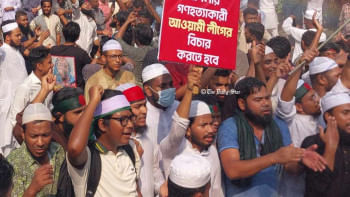Let Article 7 guide us in every way

Article 7(1): All powers in the Republic belong to the people, and their exercise on behalf of the people shall be effected only under, and by the authority of, this Constitution.
TDS: While working on the draft of the Constitution, what were the philosophies, principles and objectives that you sought to implement through the Constitution?
Dr Kamal: In the drafting committee, we were clear about upholding four fundamental principles -- nationalism, socialism, secularism, and democracy. This was because we dreamed of a Constitution that would give power to the people, and unite them in their desire to build a fair and just society where everyone would have the same opportunity to be themselves, whoever they were, and wherever they were from. We wanted every child to have access to education and every person to have access to health care, and to protect the rights of every person to a livelihood and to a secure shelter. Our hope was that the Constitution would ensure equality of all and justice for all, and eliminate discrimination based on characteristics such as sex, religion, caste, ethnicity. We also, of course, dreamed of a society where democratic rights and practices would be entrenched, given our own long struggles in the 1960s. We also wanted to ensure that there were enforceable legal rights and a robust system for justice and accountability, for those who had sacrificed their lives, or faced violence, arrest, threats and harassment in the decades of our independence struggle. We wanted justice for those martyred, their families, and women who suffered mass sexual violence in the Liberation War. Our history of discrimination, our struggle against authoritarianism, our long political mobilising against communalism and the abuse of religion, all contributed to our commitment to the values and principles which are reflected in the Constitution.
TDS: Have those dreams and expectations materialised?
Dr Kamal: Our dreams, which were woven into the constitutional demands, were those of a democratic political order in which power would truly belong to the people of Bangladesh, to be exercised through a sovereign parliament, composed of representatives elected on the basis of universal adult franchise. The dream was that this parliament would bring about social and economic transformation. Our expectation was that the representatives of the people would be totally committed to ending exploitation through implementing programmes for fundamental economic and social change. Therefore, looking at current parliamentary practices, it is difficult to assess whether those dreams and expectations have materialised. But at the same time, it is not possible to say that the constitution has fundamentally failed to serve the people.
TDS: How has the Constitution been made to deviate from its original objectives over last 50 years?
Dr Kamal: Significant regressive deviations have been made from the original objectives of the Constitution in the past 50 years. In many cases these deviations were made by those who seized power through illegal and violent means. However, we can derive satisfaction from the fact that the Constitution has somehow managed to survive these five decades. And that in some cases progressive changes have also been made to further include, or strengthen democratic structures. At this point we need to take stock of how well the goals of the Constitution have been met, and what remains to be done to ensure fulfilment of the key principles, and particularly of its promises of democracy, equality and social justice.
TDS: In what fundamental ways has our Constitution failed to serve the people?
Dr Kamal: Over these 50 years of struggle, we have had to contend against derogations of the Constitution's basic principles. Such derogations have resulted in constitutional crises at various points. However, we have been fortunate that we could in many cases resolve these through sustained people's efforts, which made possible solutions through consensus.
TDS: Which amendments have done most damage to the original vision of our Constitution?
Dr Kamal: Secularism has been a fundamental principle of our constitution since its inception. I recall Bangabandhu himself saying, "Our secularism is not against religion. Our secularism stands for harmony among members of all religions. Indeed, in the opening of the Holy Koran, Allah is described as Rabb'al-Alamin, the head of all creation and not of Rabb'al Muslimeen, the head of only Muslims. This is the spirit which underlines our secularism." Several constitutional amendments have attempted to alter this position, and I believe these may have and should have been avoided.
TDS: How can the best use be made of the Constitution to ensure our fundamental rights?
Dr Kamal: We must ensure that the rule of law and the principle of Article 7 -- that power belongs to the people -- are strictly upheld. For our rights to be protected, our people need to know more about their rights and how these are guaranteed in the Constitution. Those who have responsibilities to protect rights must also be held to account by invoking the Constitution.
TDS: What are some of the most damaging laws that have been enacted recently that damaged our rights guaranteed by the Constitution?
Dr Kamal: A number of recent laws are alarming in terms of the threats they pose to people's constitutional rights. For example, the Digital Security Act, and before it the Information and Communication Technology Act gave police the power to arrest people without a warrant, at any time of day or night, simply for words that they were alleged to have said. Of course our Constitution recognises that there may be restrictions on the right to freedom of speech, for example for incitements to violence, or spreading hatred against anyone. But arresting and imprisoning people for months together simply for making comments about politics, or drawing cartoons or writing about allegations of corruption is completely wrong. This goes against what the Constitution says, and I hope the Supreme Court will look into the impact of these draconian laws on our fundamental rights.
TDS: What steps would you suggest be taken to ensure a greater rule of law in the country?
Dr Kamal: We must ensure that the judiciary at all levels enjoys the highest confidence of the people and can exercise its powers with full independence. For this purpose, there must be total separation of the judiciary from the executive. Judges must be able to serve without fear or favour, and upholding the rights of all those who seek justice, particularly the most vulnerable. At the same time, people must be free to speak, and to organise themselves. The realisation of Article 7 -- power belongs to the people -- must guide us in every way.

 For all latest news, follow The Daily Star's Google News channel.
For all latest news, follow The Daily Star's Google News channel. 



Comments